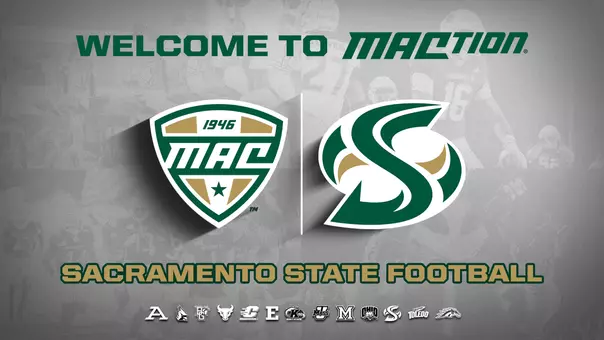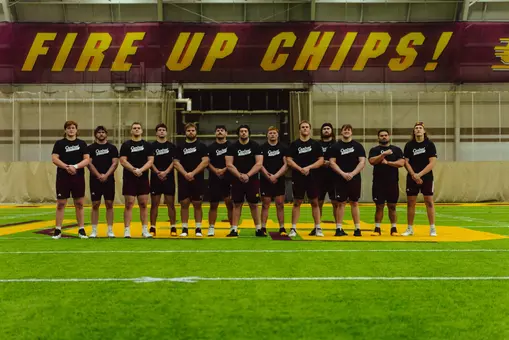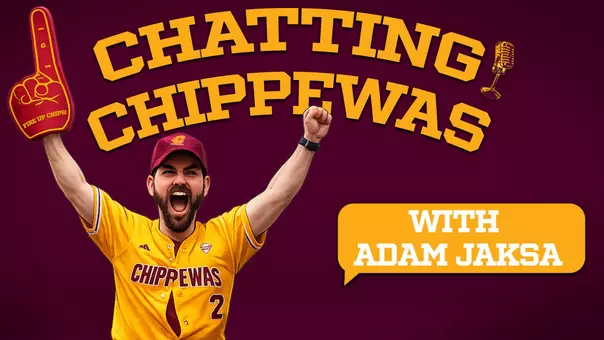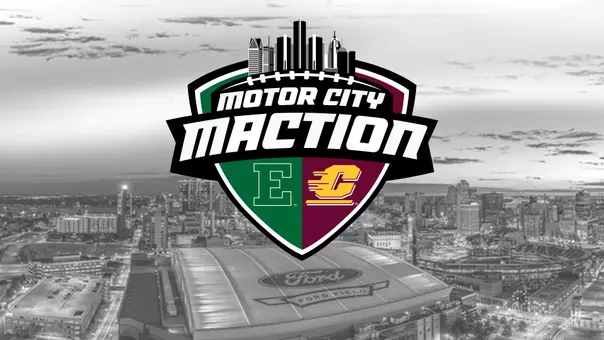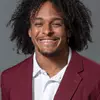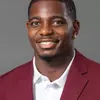Central Michigan University Athletics
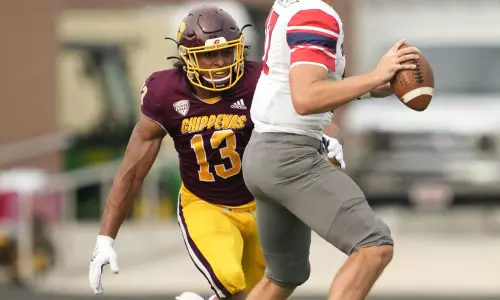
Photo by: Steve Jessmore
Sheer Will & Determination
9/30/2021 10:53:00 AM | Football
CMU defensive end Troy Hairston II makes 'em proud
MOUNT PLEASANT, Mich. – Back in the day, oh, five or so years ago, Troy Hairston II would take middle-of-the-night strolls to Central Michigan's Kelly/Shorts Stadium.
Just Hairston alone, with his hopes, his prayers, his thoughts and his goals.
"I'd ask God for a chance," he says. "It was really because of my family. I had my family in the back of my mind every night."
That chance was a long time in the making and to some, it may have seemed like a pipe dream.
He was an undersized walk-on linebacker when he came to CMU in 2016, and a back injury set him so far back that he couldn't even practice. He was relegated to working with the equipment staff in those early days.
He didn't get on the field for a game until 2018, and then made two starts and became a regular in the lineup at defensive end in 2019, helping lead the Chippewas to the Mid-American Conference Championship Game at Ford Field in Detroit.
Last season, he led the MAC with 5 ½ sacks among a league-best 12 tackles-for-loss. He was named the co-MAC Defensive Player of the Year, becoming just the third Chippewa to accomplish that feat, and the first since 2005.
He had gone from lonely walks in the dark outside the stadium, praying for a chance, to starring on the field therein.
"Part of what makes his story so good is his ability to overcome what other people's views were and continue to strive to be the best he can be," third-year CMU coach Jim McElwain said. "This is a guy who's truly a champion. It's a great story and he's earned it. He deserves it through the things that he's had to overcome."
The Training Ground
Hairston was raised in Detroit, the second of three sons born to a Detroit Police officer and an educator. His father, Troy, attended Mumford High School and then went on to play in the Philadelphia Phillies organization. His mother, Elena, emigrated to the U.S. from Panama.
"My mom, especially being a teacher, everything was school, school, school," says Hairston, the irony of football leading to an education not lost on him. "She didn't really like football at first. She was too scared for me to play.
"My dad took over the athletic part of the household."
Dad kept the son busy with sports from the get-go. Soccer, tennis, baseball, basketball. His football baptism, like so many kids in the city, came with Pop Warner and then the Police Athletic League.
"I could have been doing a lot of other things," says Hairston, whose tone suggests those other things would be considered counterproductive endeavors. "It's easy to get distracted, especially where I grew up. My dad just always kept us busy. He would invent stuff to make us better at sports.
"It was a way to teach me about life without me having to experience a lot of things. I feel like I avoided a lot of things because of sports."
When Hairston was in the eighth grade, the family moved out of the city to suburban Birmingham.
It's a mere eight-odd miles from where they had lived near the University of Detroit Mercy campus to leafy Birmingham. A few miles, but clearly a different world. Hairston was one of just a handful of minority students at Birmingham's Seaholm High School.
"It was culture shock because all those kids had things and I didn't," Hairston says. "Although we didn't have a lot, we never really went without anything. My parents always found a way to make it work."
And so did Hairston, who adapted and then excelled on the football and baseball fields—just as his mother adapted to life in the United States after coming from Panama, just as his father had when his baseball career ended and he chose to pursue a life in law enforcement in Detroit.
Football, Hairston realized as a high schooler, was his calling. CMU was his lone Division I offer, and that was only as a walk-on.
"Everyone else told me that I was too short," he says. "There was no way I was ever going to give up without really trying, giving it everything – EVERYTHING – I had. That was my biggest fear, looking at my parents and saying, 'I didn't give it my all.'"
College Life
After sitting out in 2016, Hairston got an opportunity in 2017. He worked in on special teams in practice, and he realized early on that the only way to get noticed was to be physical. Going through the motions and patiently waiting was not part of his DNA.
"The life of a walk-on, you feel different," he says. "You don't feel like everybody else. Really you have to earn your respect in everything you do."
The coaching staff back then, Hairston says, grew weary of his physical play on special teams in practice and decided that the best way to deal with him was to give him a crack on the scout team defense.
The only problem: the Chippewas at the time were stacked at linebacker. But they needed defensive ends.
Hairston pounced, and thus began his ascension.
"One of the biggest things I learned, and as I got older I really started to realize it, is that sports, especially football, is exactly how life is," he says. "Nothing is perfect, nothing is going in the same direction all the time. You're going to have those bumps in the road where you go into a spiral and it's up to you to bounce back."
Oh, he bounced alright. And he also knew where to look for help. Former teammates Joe Ostman and Mike Danna, both of whom have gone on to play in the NFL, served as mentors for Hairston at defensive end.
"Especially with Joey O and Mike being older than me, upperclassmen, they didn't have to pay attention to me or give me the time of day, but they would," Hairston says. "They would always treat me very respectfully.
"I do a lot of stuff to try and learn from everybody. I still call Joey O and Mike Danna to this day and ask them questions. I've always got questions for everybody."
Hairston, still a green walk-on trying to impress, also drew strength from fellow Detroiter Alonzo McCoy, a safety on scholarship who is today a starter in the Chippewa secondary. It wasn't tips on technique that Hairston took from McCoy, but something more intangible, something that helped his psyche.
"Alonzo, no matter what I did or no matter how I looked as a walk-on, he had my back all the time," Hairston says. "He would treat me no different than anybody else. … Him being there for me, that was huge."
Giving Back
Hairston was put on scholarship in 2019, but he has never forgotten his roots, beginning in the equipment room to those long, lonely and introspective midnight walks, to praying for a chance simply to get on the field in practice.
"I know all the walk-ons," Hairston says, "and I make sure that I talk to them: 'You can do it. Don't let anybody take that away from you and tell you otherwise.'"
It's a give-back mentality that clearly sprung from an upbringing during which Hairston saw his parents give their all for him, to mold him into the best he could possibly be. It's abundantly clear when Hairston speaks of the influences in his life, be they on the football field or otherwise.
"I don't believe that anybody does anything by themselves," he says. "And I know for a fact that if I had to do that all by myself, I wouldn't be here today; I would have quit. It's not the easiest road.
"I know that my road here couldn't have been any different and if it was, I wouldn't be the person that I am today. I know that for a fact."
Hairston, like any college football player, hopes there is an NFL future for him. It might not be a far-fetched proposition based on how far he has come as a Chippewa.
"I want to give my parents the world like they gave me," he says. "They've said that I used to ask every day when I was little, 'Are you proud of me?' They tell me all the time that they're proud of me. But for some reason, to me, it's never good enough (for me). I'm like, 'You're proud of this? Watch what's next.'
"And I try to find a new way to put a smile on their faces."
Just Hairston alone, with his hopes, his prayers, his thoughts and his goals.
"I'd ask God for a chance," he says. "It was really because of my family. I had my family in the back of my mind every night."
That chance was a long time in the making and to some, it may have seemed like a pipe dream.
He was an undersized walk-on linebacker when he came to CMU in 2016, and a back injury set him so far back that he couldn't even practice. He was relegated to working with the equipment staff in those early days.
He didn't get on the field for a game until 2018, and then made two starts and became a regular in the lineup at defensive end in 2019, helping lead the Chippewas to the Mid-American Conference Championship Game at Ford Field in Detroit.
Last season, he led the MAC with 5 ½ sacks among a league-best 12 tackles-for-loss. He was named the co-MAC Defensive Player of the Year, becoming just the third Chippewa to accomplish that feat, and the first since 2005.
He had gone from lonely walks in the dark outside the stadium, praying for a chance, to starring on the field therein.
"Part of what makes his story so good is his ability to overcome what other people's views were and continue to strive to be the best he can be," third-year CMU coach Jim McElwain said. "This is a guy who's truly a champion. It's a great story and he's earned it. He deserves it through the things that he's had to overcome."
The Training Ground
Hairston was raised in Detroit, the second of three sons born to a Detroit Police officer and an educator. His father, Troy, attended Mumford High School and then went on to play in the Philadelphia Phillies organization. His mother, Elena, emigrated to the U.S. from Panama.
"My mom, especially being a teacher, everything was school, school, school," says Hairston, the irony of football leading to an education not lost on him. "She didn't really like football at first. She was too scared for me to play.
"My dad took over the athletic part of the household."
Dad kept the son busy with sports from the get-go. Soccer, tennis, baseball, basketball. His football baptism, like so many kids in the city, came with Pop Warner and then the Police Athletic League.
"I could have been doing a lot of other things," says Hairston, whose tone suggests those other things would be considered counterproductive endeavors. "It's easy to get distracted, especially where I grew up. My dad just always kept us busy. He would invent stuff to make us better at sports.
"It was a way to teach me about life without me having to experience a lot of things. I feel like I avoided a lot of things because of sports."
When Hairston was in the eighth grade, the family moved out of the city to suburban Birmingham.
It's a mere eight-odd miles from where they had lived near the University of Detroit Mercy campus to leafy Birmingham. A few miles, but clearly a different world. Hairston was one of just a handful of minority students at Birmingham's Seaholm High School.
"It was culture shock because all those kids had things and I didn't," Hairston says. "Although we didn't have a lot, we never really went without anything. My parents always found a way to make it work."
And so did Hairston, who adapted and then excelled on the football and baseball fields—just as his mother adapted to life in the United States after coming from Panama, just as his father had when his baseball career ended and he chose to pursue a life in law enforcement in Detroit.
Football, Hairston realized as a high schooler, was his calling. CMU was his lone Division I offer, and that was only as a walk-on.
"Everyone else told me that I was too short," he says. "There was no way I was ever going to give up without really trying, giving it everything – EVERYTHING – I had. That was my biggest fear, looking at my parents and saying, 'I didn't give it my all.'"
College Life
After sitting out in 2016, Hairston got an opportunity in 2017. He worked in on special teams in practice, and he realized early on that the only way to get noticed was to be physical. Going through the motions and patiently waiting was not part of his DNA.
"The life of a walk-on, you feel different," he says. "You don't feel like everybody else. Really you have to earn your respect in everything you do."
The coaching staff back then, Hairston says, grew weary of his physical play on special teams in practice and decided that the best way to deal with him was to give him a crack on the scout team defense.
The only problem: the Chippewas at the time were stacked at linebacker. But they needed defensive ends.
Hairston pounced, and thus began his ascension.
"One of the biggest things I learned, and as I got older I really started to realize it, is that sports, especially football, is exactly how life is," he says. "Nothing is perfect, nothing is going in the same direction all the time. You're going to have those bumps in the road where you go into a spiral and it's up to you to bounce back."
Oh, he bounced alright. And he also knew where to look for help. Former teammates Joe Ostman and Mike Danna, both of whom have gone on to play in the NFL, served as mentors for Hairston at defensive end.
"Especially with Joey O and Mike being older than me, upperclassmen, they didn't have to pay attention to me or give me the time of day, but they would," Hairston says. "They would always treat me very respectfully.
"I do a lot of stuff to try and learn from everybody. I still call Joey O and Mike Danna to this day and ask them questions. I've always got questions for everybody."
Hairston, still a green walk-on trying to impress, also drew strength from fellow Detroiter Alonzo McCoy, a safety on scholarship who is today a starter in the Chippewa secondary. It wasn't tips on technique that Hairston took from McCoy, but something more intangible, something that helped his psyche.
"Alonzo, no matter what I did or no matter how I looked as a walk-on, he had my back all the time," Hairston says. "He would treat me no different than anybody else. … Him being there for me, that was huge."
Giving Back
Hairston was put on scholarship in 2019, but he has never forgotten his roots, beginning in the equipment room to those long, lonely and introspective midnight walks, to praying for a chance simply to get on the field in practice.
"I know all the walk-ons," Hairston says, "and I make sure that I talk to them: 'You can do it. Don't let anybody take that away from you and tell you otherwise.'"
It's a give-back mentality that clearly sprung from an upbringing during which Hairston saw his parents give their all for him, to mold him into the best he could possibly be. It's abundantly clear when Hairston speaks of the influences in his life, be they on the football field or otherwise.
"I don't believe that anybody does anything by themselves," he says. "And I know for a fact that if I had to do that all by myself, I wouldn't be here today; I would have quit. It's not the easiest road.
"I know that my road here couldn't have been any different and if it was, I wouldn't be the person that I am today. I know that for a fact."
Hairston, like any college football player, hopes there is an NFL future for him. It might not be a far-fetched proposition based on how far he has come as a Chippewa.
"I want to give my parents the world like they gave me," he says. "They've said that I used to ask every day when I was little, 'Are you proud of me?' They tell me all the time that they're proud of me. But for some reason, to me, it's never good enough (for me). I'm like, 'You're proud of this? Watch what's next.'
"And I try to find a new way to put a smile on their faces."
Players Mentioned
Mike Danna - Chippewas in the NFL Campaign
Friday, February 06
Super Bowl Highlights
Friday, February 06
Tyler Conklin - Chippewas in the NFL Campaign
Wednesday, January 28
Luke Goedeke - Chippewas in the NFL Campaign
Wednesday, January 28


